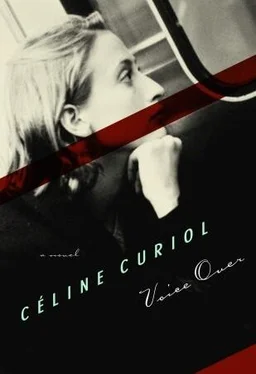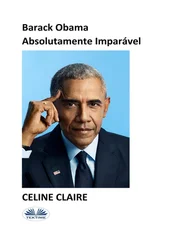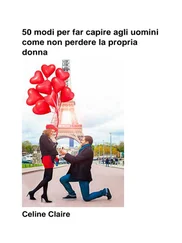Celine Curiol - Voice Over
Здесь есть возможность читать онлайн «Celine Curiol - Voice Over» весь текст электронной книги совершенно бесплатно (целиком полную версию без сокращений). В некоторых случаях можно слушать аудио, скачать через торрент в формате fb2 и присутствует краткое содержание. Год выпуска: 2008, Издательство: Seven Stories Press, Жанр: Современная проза, на английском языке. Описание произведения, (предисловие) а так же отзывы посетителей доступны на портале библиотеки ЛибКат.
- Название:Voice Over
- Автор:
- Издательство:Seven Stories Press
- Жанр:
- Год:2008
- ISBN:нет данных
- Рейтинг книги:5 / 5. Голосов: 1
-
Избранное:Добавить в избранное
- Отзывы:
-
Ваша оценка:
- 100
- 1
- 2
- 3
- 4
- 5
Voice Over: краткое содержание, описание и аннотация
Предлагаем к чтению аннотацию, описание, краткое содержание или предисловие (зависит от того, что написал сам автор книги «Voice Over»). Если вы не нашли необходимую информацию о книге — напишите в комментариях, мы постараемся отыскать её.
Voice Over — читать онлайн бесплатно полную книгу (весь текст) целиком
Ниже представлен текст книги, разбитый по страницам. Система сохранения места последней прочитанной страницы, позволяет с удобством читать онлайн бесплатно книгу «Voice Over», без необходимости каждый раз заново искать на чём Вы остановились. Поставьте закладку, и сможете в любой момент перейти на страницу, на которой закончили чтение.
Интервал:
Закладка:
In the taxi that takes her home, she replays the scene in her mind. What this woman doctor tried to get across to her was the fear of regret. Yes, time passes quickly, she knows that; she isn’t arrogant enough to think that she’s immortal. Though she may have felt anxious as she left the office, telling herself that a day would come when she would no longer be able to have children, she now knows that it makes no difference. She doesn’t want children, doesn’t want to replicate herself, but she doesn’t know why. Any more than she knows why she is sitting in this particular taxi, watching, through this particular window, these particular buildings go by. At the first pharmacy they come to, she asks the driver to pull over. Minutes later, she is back with a small green-and-white bag containing a box of medicine. The doctor probably asks the same question of all her patients of child-bearing age, women who pounce on their partners that very night, demanding to be impregnated immediately before it’s too late, or else get depressed for lack of a proper sire on hand. In the long run, what intrigues her most is how the doctor had managed to figure out that she has never given birth.
He is not outside her building when the taxi drops her off at the entrance. Throughout the journey she had clung to the hope he would be waiting for her. As she climbs the stairs, she invents excuses for him — his bosses asked him to work late; Ange, who had also fallen ill, wanted him to go and pick her up; his wallet was stolen in the métro. On reaching her landing, she tells herself that she won’t hold it against him. As she pushes open the door to her apartment, the telephone is ringing. She hurries over to answer it. I knew it was you. She says it in her new husky female voice without waiting for her caller to identify himself. She isn’t wrong. He wants to know how she is and to make sure she did go to the doctor. She is proud to confirm that she has followed his instructions. I just need to have children and I’ll be cured. He doesn’t laugh, and she has to tell him what happened. Do you want some now? No. He suggests that they meet the following Friday.
He is usually the first to arrive at the café. But three-quarters of an hour have gone by, and she is still waiting. For a while, the hissing of the espresso machine, the clinking of the cups, the rise and fall of the conversations kept her distracted. She no longer hears anything and doesn’t take her eyes off the glass entrance door, except to survey the customers or turn suddenly whenever someone brushes past her. People are coming and going, but he is never one of those people. She has already drunk two espressos and orders a third from the waiter who gives her a goofy smile and assures her that her date will be coming soon. Who would have the nerve to stand you up? She doesn’t bother to reply. She is sitting at the same table, their table; he can’t possibly miss her. Again and again, her brain spews forth the same thought: one second from now, he is going to walk through that door. He is going to walk through that door, and he will be out of breath. He will look apologetic, will say that the métro had broken down, that there was too much traffic to take a taxi, he will tell her that he’s sorry. She’ll take hold of one of his hands, won’t utter a word of reproach, delighted to be with him again. A man with his elbows on the bar has caught her attention. From the back, she thinks she recognizes the length and cut of the hair. She gets up and hurries over, steps round expecting to find him on the other side. But the person she discovers is atrociously unlike him. The man politely asks if he can be of any help. She shakes her head and rushes back to her observation post. The glass door keeps opening and closing; each time, another punch in the guts. She can feel the man at the bar eyeing her, intrigued. She avoids looking in his direction. A blonde woman comes in, then two men in suits, then a man who hasn’t shaved, then another blonde woman, then. . the whole of Paris is filing past her eyes and he’ll be the last one to arrive. So be it. She decides to stay until the café closes if she has to.
The man from the bar is standing next to her; he offers to buy her a drink. Thanks, but I’m waiting for someone. She doesn’t look up. Three very excited women have just entered the café. You’ve been waiting a while. She doesn’t answer. She hates this man sticking his nose into her life without so much of a by-your-leave. A young man with a pony-tail is tugging furiously at the glass door until, finally, he realizes that he has to push to open it. The time would pass more quickly if you talked to me. She wants to tell him to go back to sipping his beer and leave her the hell alone. But it seems wiser to ignore him and stick to her surveillance of the door. The man from the bar stands beside her for a few more seconds, his gaze weighing on her eyelids, which she refuses to lift, then, defeated by her hostility, he eventually walks off. She realizes that he has grey hair, invisible to her at first, and that he is in fact older than she had thought. She feels a bit guilty at not having been nicer. She does the arithmetic; she has been waiting for an hour and fifteen minutes. What on earth could have happened to him? Maybe he’s left a message on her answering machine, and once she goes home she’ll get a rational explanation for his absence. This thought helps her to relax a little. She takes a break from watching the door and orders a glass of white wine from the waiter, who ventures no further comments. Ten minutes later, the man from the bar is back on the offensive, standing next to her, his glass of beer in hand.
I’ll leave the moment he arrives, I promise. The man is sitting down on the seat in front of her. She is about to protest, but he doesn’t give her the chance. I’m on my own, you’re on your own, I just want to talk, no harm in that, is there? He looks sincere, she doesn’t chase him away. After all, he might help to take her mind off things. You’ll leave when. . He agrees with an understanding smile. He has yellow, smoker’s teeth, two odd lines in the middle of his forehead. To your health! She touches his glass with hers, nevertheless keeping an eye on the glass door, but everyone who walks in is a stranger. The man has noticed. So who’s the happy man? She affects an air of indifference. I don’t know if he’s very happy. She feels the man’s gaze intensify, his eyes are no longer on hers but are roaming over her chin, her cheeks, her forehead, as if he were putting her through a scanner. You should have more confidence in yourself. She lowers her eyes. The man has thick fingers, with a tiny tuft of black hair in the middle of each top joint. It has nothing to do with me; what I meant was, I’m not sure that he’s very happy. . in general. A man in a suit has rushed into the café, clutching a bouquet of flowers. For a moment she imagines, but no. Relax, he won’t have any trouble seeing you when he comes in. Now that you’re here, I’m not so sure. The man clenches his eyelids as if he’d been stung in the wrong place. She doesn’t think she’s been hurtful, just honest. But he’s already expecting her to be kind to him, even if she didn’t know who he was just a few minutes earlier. She finds that sort of logic hard to understand. Why should she be nice to him? Because he came up and approached her? Of course, she’s a little on the defensive. She doesn’t feel very comfortable; he reminds her of someone. The glass door has opened, and a woman comes in with a bundle of enraged fur on her arm. Another flop. The man is lighting a cigarette and she takes the opportunity to observe him on the sly. He must be about fifty, heavy eyelids, the skin of his face molded by age into a rather sad expression despite the alertness in his eyes. Yes, he does remind her of someone. Residues of sensations, shadows of images flit rapidly through her mind. And suddenly she knows and bites down hard on the tip of her thumb. She tries hard not to panic. Tell him to get up, to go away, to get up herself, to go away. Impossible, he might be coming, now, immediately, in the next minute; tell him to get up and go, to leave her alone. You’re very pale; are you all right? She no longer knows how to produce words. She feels hot. She focuses her attention on the flat surface of the golden liquid in her glass in an attempt to calm herself down. But she is in the pink room, sitting at the piano. Beside her, he is on the bed. She screws her eyes shut to break the image. When she opens them again, the man is holding out a glass, looking worried. She drinks down the cool water with a sense of relief. You’ll feel better now. She thanks him, not knowing how else to express the wave of affection that has swept through her. She feels rather foolish. Let’s hope he doesn’t ask her for an explanation. He sits down again and talks to her as if nothing had happened and they were starting over from the beginning.
Читать дальшеИнтервал:
Закладка:
Похожие книги на «Voice Over»
Представляем Вашему вниманию похожие книги на «Voice Over» списком для выбора. Мы отобрали схожую по названию и смыслу литературу в надежде предоставить читателям больше вариантов отыскать новые, интересные, ещё непрочитанные произведения.
Обсуждение, отзывы о книге «Voice Over» и просто собственные мнения читателей. Оставьте ваши комментарии, напишите, что Вы думаете о произведении, его смысле или главных героях. Укажите что конкретно понравилось, а что нет, и почему Вы так считаете.












